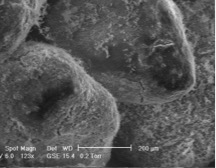
Research Project Full Title: Saving energy in drinking-water biofilter operation: A fundamental study of the relationship among nutrient conditions, EPS production, and biofilter headloss
Principal Investigator(s): Dr. Mary Jo Kirisits
Researchers: Dr. Sarah Keithley
Sponsor(s): Texas Hazardous Waste Research Center
Full Abstract: Biological water treatment is receiving increased interest in the United States because it can be used to transform organic and inorganic contaminants, including natural organic matter, nuisance taste and odor compounds, pharmaceuticals and personal care products, and heavy metals. One operational concern with biofilters is the potential for excessive headloss, shortening filter run times and increasing the energy demands for backwashing. Extracellular polymeric substances (EPS) likely play a critical role in headloss accumulation. EPS are mainly high molecular weight compounds excreted by microorganisms or produced by cellular lysis. They aid in microbial adhesion to surfaces and provide the structure for a biofilm. Nutrients (e.g., N and P) are essential for biological growth, and nutrient availability can affect microbial growth rate and production of EPS. The literature often cites a C:N:P molar ratio of 100:10:1 as necessary for microbial growth, but nitrogen or phosphorus could be limiting in a biofilter because the biodegradable organic carbon concentration can be increased by ozonation (commonly used upstream of a biofilter) or because phosphorus is removed during coagulation. Some previous studies have shown longer filter run times when the influent was amended with ammonium and/or phosphate, but the role of EPS in biofilter hydraulic performance has not been shown definitively.
This research seeks to improve the hydraulic performance of biofilters by lengthening filter run times. The primary project objectives are to develop an EPS extraction protocol for biofilters and to examine the relationship among C:N:P molar ratios, EPS concentrations, and headloss accumulation in bench-scale biofilters.
